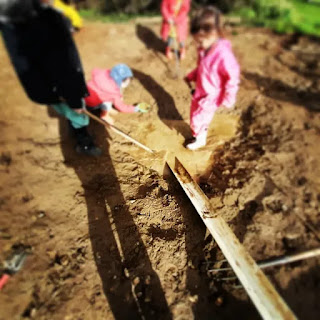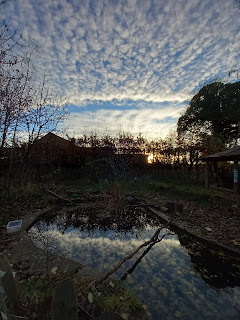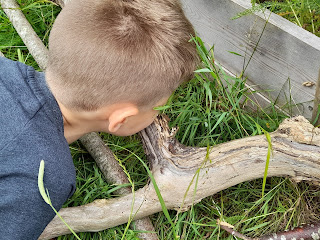Must Understand Dirt
The children have long since ceased to view rain as a problem. Rain means water trapped in tarps to create mud. It lands on the floor creating mud. It fills holes in the ground forming muddy puddles. Rain, drizzle, sporadic showers, constant splodges, huge bouncing drops, and continual deluge, all equal: MUD, and that's fine by them!
The Dig Pit is an uneven surface, potholed from daily digging with meandering trenches running through it, and perfect for collecting pools of rainwater. The largest ditch of all was originally two separate holes joined (by year 5) in an attempt to collect even more rain into one place. When it rains now, we have more of a pond than a puddle. I half expect ducks to move in when we're having a particularly wet week.
When I took this job I was told that many children don't look forward to Forest School, that they hate being wet and cold, and even the children who hadn't done FS yet were anticipating it to be miserable because of the stories their older siblings tell...
Granted there wasn't a digging area, but there were always puddles, always ways to capture rain, always the lovely British weather! Always the potential to enjoy the weather whatever it is.
Two and a half years on, those children literally cheer when they walk past the Dig Pit and see it full of water!
Working with mud does carry risks. Our puddles may be there for days, we have no idea what animals are near it when we aren't, it has the potential to carry a few waterborne diseases, and even if freshly fallen, it's liquid mud and by definition: muddy!
It can discolour clothes.
It should never be drunk.
It is cold.
Wet socks WILL rub your feet in your wellies.
Wet walking shoes or trainers will feel like cardboard.
Wet clothes will make you feel colder even in summer.
Our Risk Assessment acknowledges this, the children understand that NOTHING in Forest School EVER goes in the mouth - unless cooked by an adult, while you are with an adult, and only at basecamp. This does mean that we don't allow foraging, not even blackberries! It is easier to have a set rule rather than a rule that is sometimes OK in this instance, and sometimes OK in those circumstances...
Every session we discuss the effects of the weather, albeit heat or snow, fog or rain, MUD is usually a given! Most of the children have had wet socks, wet feet, or wet shoes. They've sloshed around in wellies full of puddle from jumping and stamping and even standing in a place too deep for 3/4 wellies! We take a moment to remember the discomfort and to decide if we want to risk those feelings again!
Each session ends with a trip to wash hands in soap and water, One of the good things to come from covid is the children's understanding of how to clean their hands properly! In between, if we need to remove caked mud before using tools etc we rub our hands on grass to brush it all off (this works remarkably well!). Our celebration sessions, complete with campfire, biscuits, and marshmallows to melt, START with the treat, as soon as everyone arrives. This means that hands are as clean as they are going to get this session as everyone should've gone to the toilet and washed their hands before arriving! It also means they get to run off the sugar high and excitement of the treat before going back to class, and the campfire can be extinguished and made safe if not required for the rest of the session.
What works for us may not work for other Forest Schools. We have classes outside for about 90 minutes, they come out weekly, they arrive with a TA or teacher, they return to lessons, there may be more than 30 children attending. Working to these circumstances will vary vastly to (ie) a Forest School with several volunteers who have a dozen children outside all morning and include lunch!
We love mud!
The children have learned how to mix it to a consistency fit for purpose; paint, clay, mud pie, 'hamburgers', playdough, flubber...
They build bridges out of mud, or sticks, or pallets, or everything, ensuring supports and practicality.
They design, plan, discuss, listen, communicate, and work as a team.
They cooperate and collaborate. Sometimes they lead, sometimes they follow. They allocate roles, they leave to find suitable resources, they incorporate many ideas. They work with friends and peers, mixing up friendship groups and including those they may not usually interact with often.
They explore science, maths, English, geography, technology, and engineering.
They bring prior knowledge, snippets of how Romans built bridges, or how irrigation works on an African farm. They share and swap new vocabulary, they create new terms when explaining, they go away for a week and return with more information and a will to try again. They demonstrate self-motivation, self-achievement, and self-esteem. They celebrate together and each other.
They also wallow in the sensory aspect of mud. Oozing it between their fingers and literally rubbing it onto their skin.
They splash in the puddles, throw in stones and watch the droplets and the ripples expand on the water's surface.
They listen to the mud squelch and splat.
They savour the earthy smell and recognise if something is wrong!
They do knee slides through it.
They belly flop onto it.
They leave Forest School frequently looking like extras from a movie about The Somme!
The digging and the kneading and the mixing and the building requires their physical motor skills, their concentration, their imagination, their language, and their social skills.
It also requires a brave washing machine and somewhere to store filthy boots!
It's easy to focus on the aftermath. The clean-up. It can be labour intensive and it usually equates to some kind of monetary cost in cleaning products and/or time.
We also know that spending time around soil, dirt, mud, builds the immune system and makes humans healthier!
We mitigate the mess by stripping their boots off at the school door and walking through the building in socks! Luckily we have more than one entrance so we also aim for the one nearest their classroom!
Whatever is being explored or investigated or learned, children seem to prefer it with MUD! Mud Is the glitter of Forest School, it gets everywhere but it makes the task more eye-catching!
The benefits of mud outweigh the pitfalls! So much independent, child-led learning can come from an hour in the dirt.
We all:
Must
Understand
Dirt
It's so worth it!














Comments
Post a Comment